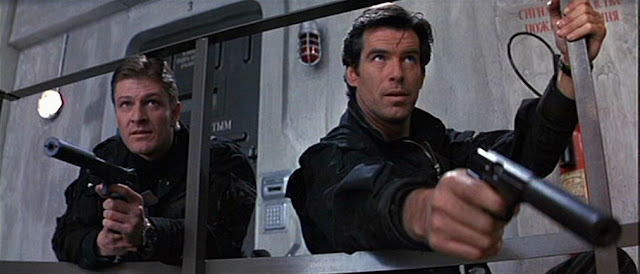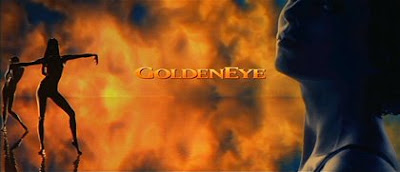 |
| (Photo source: New York Times) |
Have you ever heard score music that's so terrible during a certain movie that its trailer music sounds like Beethoven by comparison? Michel Legrand, whose jazzy and very French score for the original Thomas Crown Affair is one of the highlights of that very '60s caper flick, clearly had an off day when he wrote the score to 1983's Never Say Never Again, the unofficial 007 movie that was the weird result of a legal dispute that allowed Thunderball to get remade with Sean Connery in the role of Bond again. (The messy circumstances that led to the production of the non-canonical Never Say Never Again--the last 007 movie to pit Bond against SPECTRE before next winter's canonical 007 movie Spectre--are like if the Indiana Jones franchise got embroiled in some sort of legal beef between Disney and George Lucas that would be too convoluted to imagine in detail here, and as part of the settlement, Harrison Ford got to star as Indy one last time in a rival Indy movie for another studio while Disney worked on its rumored reboot with Chris Pratt as Indy.)
The much-maligned GoldenEye score by French composer and frequent Luc Besson collaborator Eric Serra--the only cue I really dig during Serra's score is the very first one, the 17-second gunbarrel music--isn't the worst score written for a Bond movie. Nope, the "worst Bond score" honors would have to go to Legrand's tin-eared score. I realized his weirdly chintzy-sounding and sometimes yacht rock-ish score is the worst after I rewatched Never Say Never Again on Netflix only a few hours before the streaming service lost the streaming rights to the movie once again and had to yank it from its library over the weekend. It's the first time I've watched Never Say Never Again in its entirety since the very first time I saw it--on VHS as a kid. I barely paid attention to Never Say Never Again that day because I was too busy playing with the Christmas present my parents gave to me right before they rented a VHS of Never Say Never Again, and that toy happened to be this:
 |
| (Photo source: ActionFigurePics) |
 |
| (Photo source: Vintage Action Figures) |
When you're a kid whose attentions are divided between play-acting battle strategy conversations inside a huge castle playset between He-Man and Mekaneck about how they're going to metaphorically skullfuck the forces of Skeletor and Trap Jaw and watching a VHS of an overlong and clunkily paced but lavish spy flick, it's a little difficult to pay attention to the spy flick. But the one thing I do remember from that Christmastime viewing of the VHS rental of Never Say Never Again is Connery getting stabbed right after the easy-listening sounds of former Sergio Mendes and Brasil '66 vocalist Lani Hall's Never Say Never Again theme song.
Thanks to cable network airings of Never Say Never Again that failed to lure me into rewatching it in its entirety and YouTube clips of the opening titles, I'm constantly reminded of how poorly Hall's ballad--which was composed by Legrand and produced by both Hall's husband Herb Alpert and Mendes himself--fits with the opening action sequence. It's not the worst tune, but "Never Say Never Again" is yacht rock-era Sergio Mendes and Herb Alpert, not "Mas Que Nada"-era Sergio Mendes and Herb Alpert.
Together with Hall and the rest of Brasil '66, "Mas Que Nada"-era Mendes and Alpert were responsible for one of the coolest covers of a Bond song, their remake of "The Look of Love," another tune from an unofficial Bond movie, the 1967 version of Casino Royale. The lackadaisical feel of this later Bond song from Hall, Mendes and Alpert robs Never Say Never Again's opening action sequence of any tension or suspense. Yacht rock and spy movies are a terrible combination. It's why I don't like the Rita Coolidge version of "All Time High" the late John Barry produced for Octopussy--a rare musical misstep by Barry--and I instead prefer the more dangerous-sounding (especially at 3:06) Pulp cover of "All Time High" David Arnold produced for 1997's Shaken and Stirred: The David Arnold James Bond Project, the cover album that landed Arnold the gig as Tomorrow Never Dies score composer.
The rest of Legrand's Never Say Never Again score is far worse than the opening theme and lacks the oomph, tunefulness, grandeur and sexuality of the best of Barry's work for the official Bond movies. Oomph, tunefulness, grandeur and sexuality are four reasons why, like recent "Uptown Funk" mastermind Mark Ronson once said in 2011, Barry's work has been sampled so much by hip-hop artists ("It's mean stuff. It's not pretty or sanitised. It sounds tough," wrote Ronson). Legrand's score is a good example of why French musicians shouldn't be scoring Bond movies. Unless they're Daft Punk. That's because I like those two helmeted motherfuckers and I like how the idea of Daft Punk scoring a Bond flick would make way-too-conservative Bond fanboys--the same fanboys who are way too intense about their hatred of French electronica artist Mirwais for producing Madonna's much-maligned Die Another Day theme--squirm.
The Never Say Never Again trailer music has more oomph than the actual music in the movie. Sure, the unknown composer who wrote the trailer music was clearly imitating Bill Conti's score from an official Bond movie, 1981's For Your Eyes Only, without using the Barry/Monty Norman Bond theme that Conti had the freedom to include and neither Never Say Never Again producer Jack Schwartzman (the late husband of Talia Shire, as well as the father of Jason Schwartzman) nor Warner Bros. had the rights to use for their rival Bond movie.
But the anonymous Conti wannabe's trailer music gives off sparks in ways that Legrand's score fails to do. Combined with both the way the trailer house pieced together footage of the movie and the baritone of Peter Cullen (a.k.a. Optimus Prime), the voice of so many trailers and TV spots for '80s Bond flicks, the trailer music makes Never Say Never Again appear to be a more exciting action movie than it actually is.
The best things about Never Say Never Again are the performances of Connery--who's more awake during Never Say Never Again than he was when he sleepwalked through You Only Live Twice because he was sick and tired of the Bond franchise at the time of You Only Live Twice's filming--and Barbara Carrera, who steals the movie as Fatima Blush (like Luciana Paluzzi did during Thunderball when she played the same villainous character, Fiona Volpe, in that version of the story, 18 years before). Carrera was even nominated for a Golden Globe for her performance as Fatima. Throughout my rewatch of the movie on Netflix, all I could think, especially when Carrera wasn't on screen, was "All that money that's up there on screen, and they couldn't get Raiders of the Lost Ark cinematographer Douglas Slocombe to light the locations with more panache, and they couldn't get Connery a more convincing toupee."
The mid-'80s were not exactly the greatest period for Bond movies, whether official or unofficial, although Octopussy has its moments, dumb Tarzan yell gag and questionable attitudes towards Indians aside. I don't know if the most underwhelming aspects of Never Say Never Again were because of cocaine or because of the Taliafilm production company's cluelessness about how to craft a Bond movie a la the Broccoli family, which runs the Bond movie franchise like a tight ship. But when you hire folks like Legrand, Slocombe, Empire Strikes Back director Irvin Kershner and stuntpeople from Raiders of the Lost Ark and they're not putting in their best work (one minute, Kim Basinger's escaping from a castle on horseback, clad in just a slip, and then the next minute, her stunt double's leaping off the castle fully dressed, or maybe those aren't long sleeves and that's the stunt double's actual skin, which is far lighter than Basinger's), the blame for those underwhelming aspects has to be put on the badly distracted leadership of Schwartzman, who was reportedly too busy dealing with constant legal battles with the Broccoli family and Eon Productions to be present for the day-to-day shooting. His absence "left the actual supervision of production in the hands of barely-qualified subordinates," wrote You Only Blog Twice blogger Bryant Burnette.
 |
| (Photo source: Lewis Wayne Gallery) |
 |
| (Photo source: You Only Blog Twice) |
Legrand's tepid-sounding Never Say Never Again score cues have been frequently excised from the movie by Bond fanboys in fan edits of Never Say Never Again they've posted on YouTube or outside YouTube. I think they should try inserting into their Never Say Never Again re-edits the theme songs from Bond video games like the Quantum of Solace video game and Blood Stone, which are more enjoyable tunes than most of the opening themes from the '80s and '90s Bond movies themselves.
The Legrand cues are, of course, not part of "AFOS Incognito," the new espionage genre music block at midnight on AFOS. Only the best original music from spy movies or shows is streamed during "AFOS Incognito," like Barry's On Her Majesty's Secret Service cues "This Never Happened to the Other Feller" and "Main Theme." Barry, show 'em how it's done.














